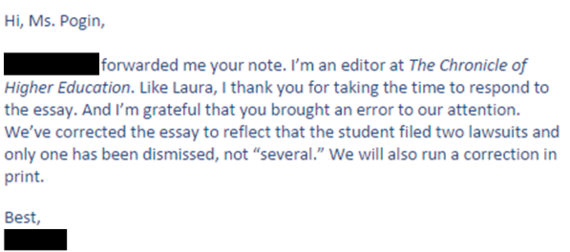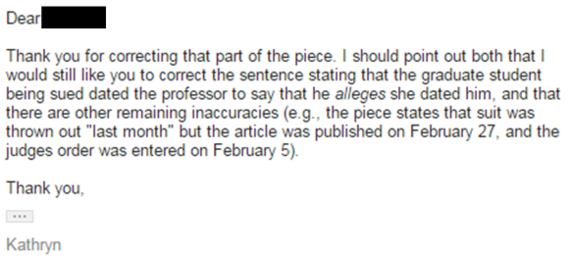Last week, Laura Kipnis, a professor at my own institution, Northwestern University, published an opinion piece at the Chronicle of Higher Education, bemoaning that "menopausal women now occupy more positions of administrative power, edging out at least some of the old boys and bringing a different hormonal style--a more delibidinalized one, perhaps--to bear on policy decisions." There are many aspects of the piece one could criticize (as other Northwestern community members have done). Her thesis strikes me as absurd; her language, offensive; her mockery of her own students, inappropriate for a professor; her writing, self-undermining (if one wants to argue that there was a time when sexual relationships between professors and students were only potentially embarrassing, and entirely unproblematic with regard to consent, best not to say things like, "When I was in college, hooking up with professors was more or less part of the curriculum," as curricula are set by instructors, not students). Perhaps most importantly, though, Kipnis presented her argument, and the Chronicle of Higher Education published it, in reckless disregard for factual accuracy.
In the service of providing an example of the supposed "sexual paranoia" regarding faculty-student relationships, Kipnis discusses a cluster of lawsuits related to recent events involving some of my colleagues in the Department of Philosophy at Northwestern University. Her treatment of the facts surrounding these lawsuits is misleading in some ways, and in others, it is at best insufficiently supported, at worst simply false. I wrote to Kipnis and editors at the Chronicle of Higher Education outlining some of those inaccuracies (the full letter can be read here):
In your article you write, "The professor sued various colleagues, administrators, and a former grad student he previously dated, for defamation." As an editorial comment, your argument is more persuasive than it otherwise would have been had you included that the reason the graduate student is being sued for defamation is because she, like the undergraduate student whose allegations you describe at least a bit, brought an internal Title IX complaint against the professor for sexual assault, in this case, alleging that he raped her. But, editorializing aside, this sentence does what you purported to find so disturbing about the use of the of the term 'survivor' by some campus activists--it makes a claim on the basis of allegations which are as of yet unsupported. You claim that the professor previously dated the graduate student he is suing. The foundation for that claim is his own legal complaint against her. The graduate student has neither confirmed this is the case, nor had a chance to dispute the claim in court given that her motion to dismiss had to presume all the facts as he alleged them could be substantiated, whether or not she believed that to be true. Moreover, given that the university's finding that he sexually harassed her was based precisely on the relationship which he alleges was consensual, one must wonder how a relationship could be found to both sexually harassing and consensual at one and the same time.
You also write, "He sued the university for gender discrimination (he says he wasn't allowed to present evidence disproving the student's allegations)--this suit was thrown out; so were several brought by the student." The undergraduate student brought two lawsuits. One against the university, one against the professor. The one against the university was dismissed--the one against the professor was not. The student has brought no other lawsuits. To say that "several" brought by the student have been thrown out is both false and damaging.
In other words, Kipnis's article in the Chronicle relied on factual errors and a misleading presentation of information which just happened to craft a narrative of events more supportive of her own favored view.
The conversation which ensued underscores the lack of care and attention to detail this piece was handled with, and which it is incumbent upon journalists to exhibit--particularly when they risk doing harm to their subjects.
First, Kipnis replied, thanking me for responding to her piece. When I asked if she was planning to issue corrections, she indicated that she was not. A particularly illuminating exchange between me and some of the editors at the Chronicle then followed:


The last of the emails above was written by an editor for the Chronicle, the intended recipient was another editor, and it was sent to me by accident. I replied to make them aware of the mistake, and further to say that while I was sorry they found my original email an incomprehensible tirade, I was also sorry that they had published an irresponsible and inaccurate article. The editor sent an apology in reply, and finally, a notice that while they would correct the inaccurate reference to the date (note: while the Chronicle has since updated the piece to reflect this correction, it is not mentioned alongside the other in the notice of correction following the text), no further corrections or qualifications would be made.
Laura Kipnis is perfectly welcome to hold whatever view of faculty-student relationships she likes. She is also welcome to publish those views, and the Chronicle of Higher Education is welcome to assist her in doing so. What is not welcome is willfully misleading the public, particularly when Kipnis is exploiting the misrepresentation of events which are surely deeply important and deeply painful for all of those directly involved. It is striking that those concerned in publishing a piece which questions the credibility of women who allege to be victims, and mocks their experiences as 'melodrama,' only feel the need to qualify some allegations as allegations, and seem to feel no need to be sensitive to how inaccuracy might damage their own credibility. Perhaps when you are an accomplished university professor, or the most respected news source dedicated to higher education, credibility comes in comfortable excess. The entire affair is fitting, though, as a microcosm of the dynamics behind the larger problem of sexual violence on college campuses.
It is unfortunate that an opportunity for real conversation has been lost. How we can retain valuable aspects of sexual liberation while protecting those who would be harmed by abuse of power is an interesting question--but arguments against limits on faculty-student relationships could be better made without misrepresenting facts, and without exploiting vulnerable students at one's own university to score political points. While Kipnis laments that codified limits on faculty-student sexual relationships are "intellectually embarrassing," one might wonder whether she is embarrassed by her argument against them. Or, further, whether the Chronicle of Higher Education is embarrassed by its handling of it. "This girl" does.
Kathryn Pogin is a graduate student in philosophy at Northwestern University, and knows some of those who were sued, including her fellow graduate student discussed above.

